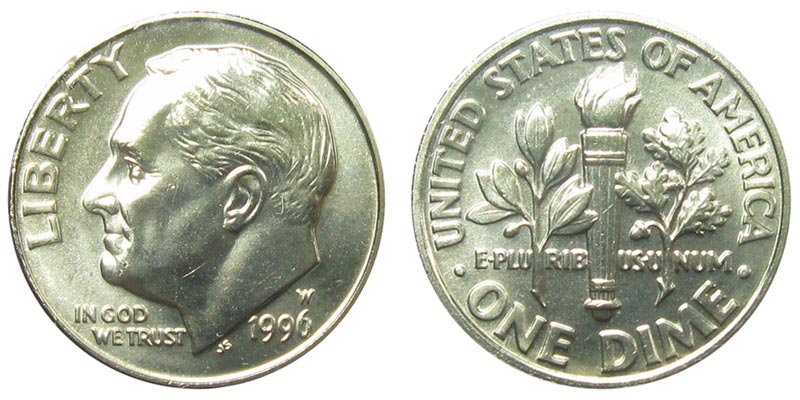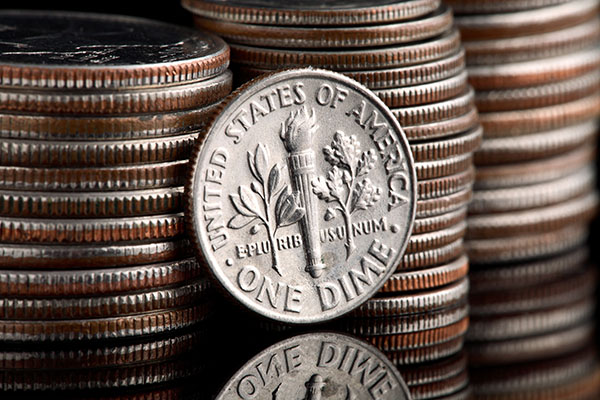Key Date Roosevelt Dimes: Collecting Tips
The Roosevelt dime has been in production since 1946 and is one of the most popular collectible coins. Despite its many decades in circulation, the Roosevelt dime generally doesn't offer any major rarities.
Yet, as most Roosevelt dime enthusiasts could explain, there are many other valuable issues in the series. But you must know what to look for!

2013-S Roosevelt dime proof
Roosevelt Dime Key Dates
Millions upon millions of Roosevelt dimes have been struck during any given year. But there are many dates in the series that are considered scarce. This is particularly true in the top uncirculated grades, and with Full Bands details on the torch on the coin's reverse. Then there are the many rare varieties that are found on business-strike and proof Roosevelt dimes.
Bear in mind that no regular-issue business-strike Roosevelt dime is rare in the absolute sense. This is unlike the 1909-S VDB Lincoln cent or 1916-D Mercury dime. Such coins are worth a substantial sum in any condition. There are no Roosevelt dimes that were minted for circulation and are also rare and valuable in any grade.
The only circulation-issue Roosevelt dimes that are worth more than face value regardless of condition are the pre-1965 90% silver Roosevelt dimes. These are worth extra money due to their precious metal content.
What follows is a list of regular-issue Roosevelt dimes as well as varieties. These coins are indeed worth substantial premiums above their face value.
*Values are for coins that are typical representatives of their grades.
Proof Roosevelt Dimes
As illustrated above, there are several Roosevelt dimes that are worth substantial money on the basis of their condition or variety. However, it’s important to recognize the value of two other classes of Roosevelt dimes that are worth a second look. These are pre-1965 proofs and Full Bands uncirculated dimes.
All pre-1965 proof Roosevelt dimes are worth significant premiums due to their scarceness. They are therefore highly collectible. Here’s a rundown on the values of proof Roosevelt dimes struck from 1950 through 1964:
*Editorial note: The year 1950 marks the beginning of production for proof Roosevelt dimes. This followed a wartime moratorium on proof coinage dating back to 1943.
A Word About Full Bands Roosevelt Dimes
And what about Full Bands (FB) Roosevelt dimes? Values for these coins are much more sporadic. They are dependent on the individual year of the coin as well as its grade and overall condition. The marketplace for FB Roosevelt dimes is still growing. The importance and rarity of these coins has become better understood by the numismatic community.

1996-W Roosevelt dime
Determining a FB Roosevelt dime from one that isn’t requires close inspection of the reverse. The design is anchored by a torch and flanked on the left (as seen by the viewer) by an olive branch and on the right with an oak branch. The torch features horizontal bands on the upper and lower part of the handle. Each of these bands has a single horizontal line that, on a well-struck coin, will appear complete and bold from left to right. This band is seen fully struck on most proof Roosevelt dimes, but on the majority of business strikes it’s rather faint or incomplete.
Therefore, an extra value is placed on the business-strike Roosevelt dimes that show complete band lines. These so-called Full Bands or FB Roosevelt dimes are prized by all types of collectors. In recent years they have gained a strong collector base among those building sets of high-grade Roosevelt dimes. Oftentimes these coins have been certified by a third-party coin grading service.
These slabbed, FB Roosevelt dimes will often find their way into registry sets. These are assemblages of coin sets built using only third-party graded coins. Typically the coins will all be certified by the same grading service. Each set is listed and displayed online.
Given the competitive nature of building registry sets, those who assemble such sets will usually include Full Bands Roosevelt dimes. These represent the scarcest and best-struck examples. FB dimes can help one's Roosevelt dime registry set gain a better score.
The marketplace for Full Bands Roosevelt dimes continues to evolve. Over time, we could see even greater consensus as to the values and relative availability of certain dates and mintmarks that warrant the coveted FB designation.
However, it's already evident that the FB detail is extremely rare on certain issues, such as the 1978 (Philadelphia). On other issues the appearance of Full Bands is rather common and does not induce a major jump in price from similarly graded non-FB examples. But, in most cases, a FB Roosevelt dime will usually be worth many multiples of its non-FB counterpart.
History of the Roosevelt Dime

Stacks of Roosevelt dimes
Roosevelt dimes kicked off in 1946 within months of President Franklin Delano Roosevelt’s passing on April 12, 1945. His death was caused by a cerebral hemorrhage at the age of 63. Roosevelt was diagnosed with polio in 1921 at the age of 39. He spent many years advocating for the elimination of polio and support for those with the debilitating disease.
One of the polio-related causes Roosevelt spearheaded was the March of Dimes. The program tasked Dr. Jonas Salk with pursuing a polio vaccine. Upon Roosevelt’s death while serving his fourth term as president, it was deemed fitting by many that he be honored on the dime. Thus, United States Mint Chief Engraver John R. Sinnock created a design honoring the late president. The new Roosevelt motif replaced the Mercury dime.
While the Roosevelt dime launched as a 90% silver coin in 1946, the composition was changed to copper-nickel clad in 1965. This is when the United States Mint began debasing coins due to the rising cost of silver. Circulating Roosevelt dimes have retained the copper-nickel clad composition since. But in 1992 the U.S. Mint began striking certain proof examples and other numismatic specimens in silver again.
Joshua McMorrow-Hernandez is a journalist, editor, and blogger who has won multiple awards from the Numismatic Literary Guild. He has also authored numerous books, including works profiling the history of the United States Mint and United States coinage.
Read more about dimes and other U.S. coins from the author:
Roosevelt Dime (1946–date): Values & Historical Background
Mercury Dime (1916–1945): Values & History
Key Date Mercury Dimes: 1916-D, 1921, 1921-D
Key Date Barber Dimes: Price Guide
Junk Silver FAQs: Must-Know Facts About 90% Silver Coins
